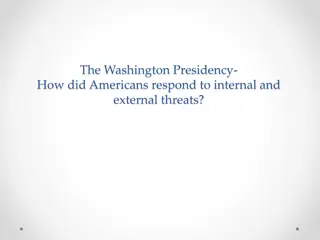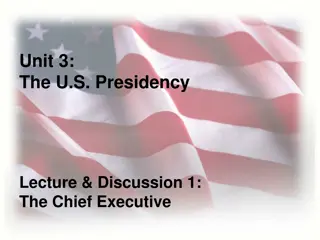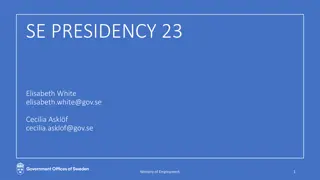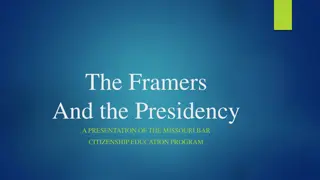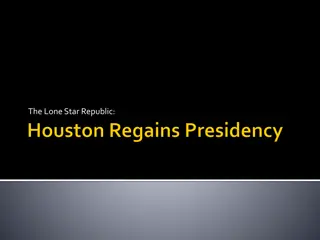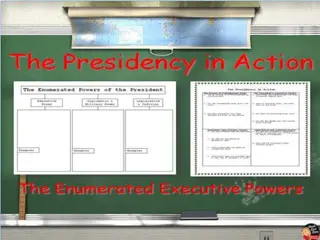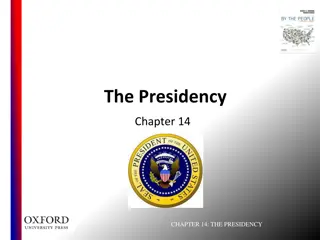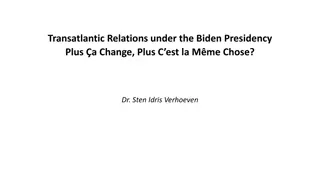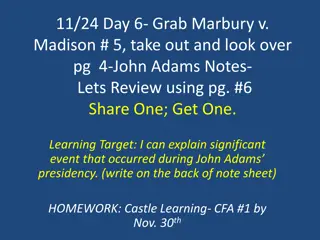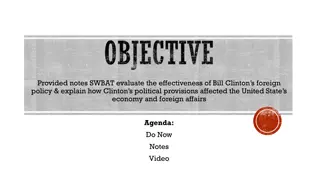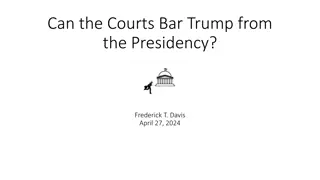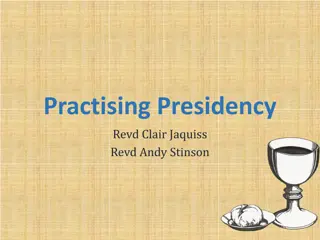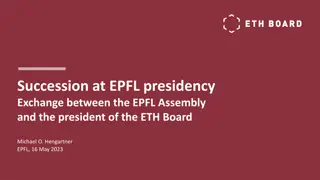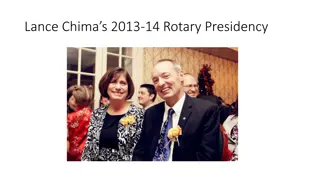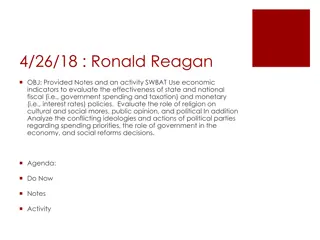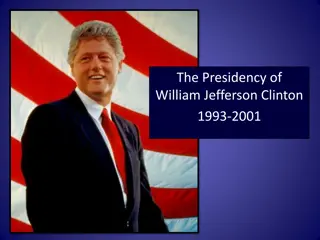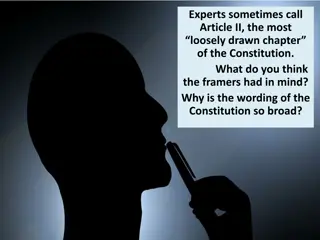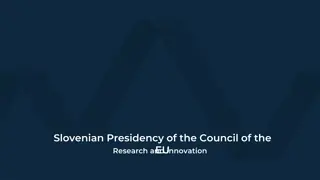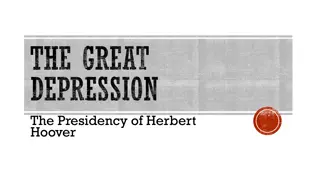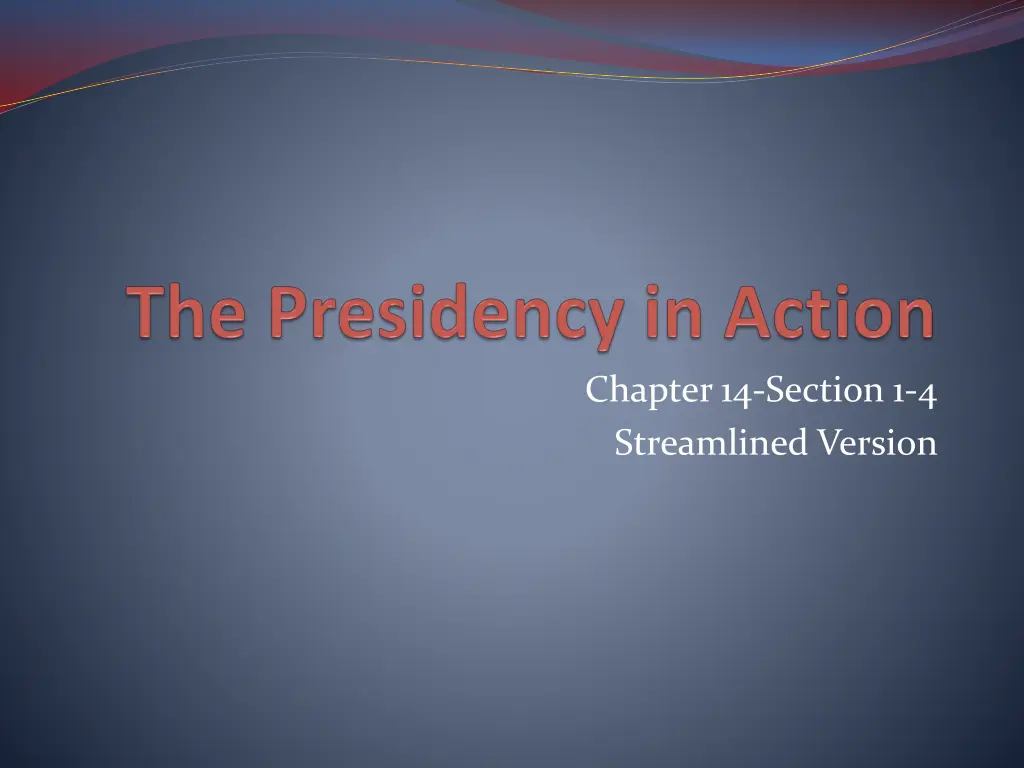
Presidential Powers: A Comprehensive Overview
Explore the growth of presidential power in the United States, from the Constitution's vagueness to the President's authority to enforce laws, issue executive orders, make treaties, and more. Delve into the diplomatic and military powers of the President, including the ability to send troops into combat and negotiate agreements with other nations.
Download Presentation

Please find below an Image/Link to download the presentation.
The content on the website is provided AS IS for your information and personal use only. It may not be sold, licensed, or shared on other websites without obtaining consent from the author. If you encounter any issues during the download, it is possible that the publisher has removed the file from their server.
You are allowed to download the files provided on this website for personal or commercial use, subject to the condition that they are used lawfully. All files are the property of their respective owners.
The content on the website is provided AS IS for your information and personal use only. It may not be sold, licensed, or shared on other websites without obtaining consent from the author.
E N D
Presentation Transcript
Chapter 14-Section 1-4 Streamlined Version
The Growth of Presidential Power The Constitution is intentionally vague about the powers of the President. The President has become more powerful over time: The executive branch has a single leader. As American life has become more complex, the people have looked to the President for leadership. In emergencies, the President needed to take action. Congress has asked the President to carry out laws. Imperial President: Term used by critics of strong presidential power Section 1
Executive Power The power to carry out the laws comes from two sources: Article II of the Constitution His oath of office: to preserve, protect & defend Ordinance Power: The power to issue executive orders Executive Order: A directive, rule, or regulation that has the effect of law. The President has the power to choose the top officials of the executive branch. Cabinet members, diplomats, ambassadors, federal judges and military officers. Section 2
What powers does the President have? Enforce the law 1. 2. Administer the law 3. Issue executive orders 4. Appoint and remove executive officials ** The President cannot remove federal judges and generally can only fire those whom he has appointed. Section 2
Section 3 Diplomatic and Military Powers May make treaties with other nations, with Senate approval May make executive agreements with the heads of other nations Major Diplomatic and Military Powers of the President May send US troops into combat without Congressional authorization for 60 days May extend and withdraw recognition of other countries
Diplomatic and Military Powers The President can make treaties (formal agreements) with other nations. Requires Senate approval He may also make an executive agreement (pact) with another nation. Does not require Senate approval He has the power of recognition acknowledge and support the existence of another country Does this by sending and accepting ambassadors Section 3
Diplomatic and Military Powers If the President is unhappy with a certain nation he can call for that nation s ambassador or other diplomatic representatives to be recalled (or removed) The person recalled is declared persona non grata which is an unwelcomed person As the commander in chief the president has the power to: Make undeclared wars Help pass congressional resolution Use other military powers Including War Powers Resolutions
Legislative and Judicial Powers Legislative Powers Judicial Powers May recommend legislation May veto legislation with a regular veto or a pocket veto May allow a bill to become a law either with or without a signature May grant a reprieve on a sentence May grant a pardon for a crime May commute the length of a sentence or the amount of a fine May grant amnesty to a group of law violators Section 4
Legislative & Judicial Vocabulary Line-item Veto: May approve some parts and veto other parts of spending bills Pocket Veto: A President can let a bill die without signing it before Congress adjourns Reprieve: Postpone the execution of a sentence Pardon: Legal forgiveness for a crime Commutation: The power to reduce the length of a sentence or the amount of a fine Amnesty: A general pardon granted to a group of violators Clemency: Leniency or mercy used in cases of federal offense Section 4

